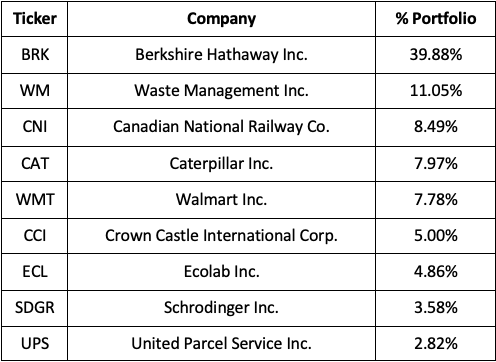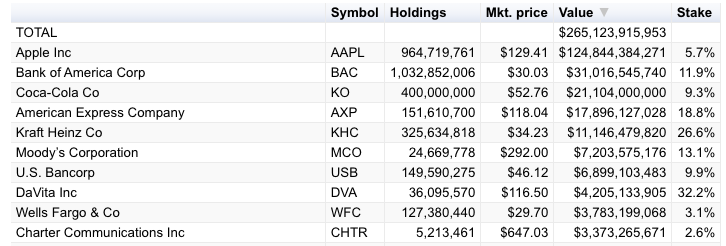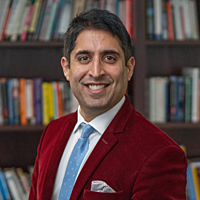How the billionaires are investing in 2021
Editor's Note: On 8 January 2021 Tesla's Elon Musk pipped ahead of Amazon's Jeff Bezos on the Bloomberg Billionaires Index, officially making him the new world's richest person. Musk's net worth totals $188.5 billion, slightly more than US$187 billion for Bezos.
2020 was a terrible year for so many, with COVID-19 exposing fault lines in the world's healthcare, political and economic systems. Yet despite all the trauma and disruption the wealthiest of the wealthy made more money than ever.
Tech tzars Jeff Bezos, Bill Gates, Mark Zuckerberg, Elon Musk, along with Bernard Arnault (the chairman of Louis Vuitton), collectively added $230 billion to their total wealth, which now sits at around $700 billion according to the Bloomberg Billionaires Index.
Remarkably, their ascension even knocked Warren Buffett out of the top five list for the first time since the index began in 2012.
So, what can we mere mortals learn from them? In this wire, I explain how they did it and how they plan to do it again in 2021.
But first here are the highlights among the rich for 2020:
- Jeff Bezos became the world’s richest person in the Bloomberg Billionaires Index, overtaking Bill Gates (who dropped from #1 to #3)
- Elon Musk bolted to #2 on the list, his fortune increasing from $US26.6 billion to $US153.5 billion
- Warren Buffett dropped out of the top five for the first time, and at one stage his wealth trailed that of Google founders Larry Page and Sergey Brin, as well as former Microsoft CEO Steve Ballmer in the rankings
- Four of the five wealthiest people on the planet are from the technology sector
Investment strategies of the ultra-rich
Jeff Bezos (Founder, Amazon)
- Total net worth: US$187 billion
- Wealth increase in 2020: +63% (US$72.4 billion)
- Strategy: Reinvestment
The founder of Amazon (NAS:AMZN), the world’s largest online retailer, overtook Microsoft co-founder Bill Gates to become the planet’s richest person in 2020.
Bezos owns about 11% of Amazon stock, according to a November 2020 SEC filing. He held 15% of the company before a 4% stake was transferred to MacKenzie Bezos in 2019 following the pair's divorce, which resulted in him forfeiting US$36 billion in equity to his former partner.
But the events of 2020 made last year’s loss an uneventful experience in the grand scheme of things. Riding on the coattails of pandemic-driven online shopping, streaming and work-from-home boom, Amazon’s stock price soared 70%.
Defying the traditional view that earnings slow as businesses mature, Amazon had its most profitable year ever. The conglomerate generated US$14 billion in net income during the first nine months of 2020, compared to US$11.34 billion in all of 2019!
While it may be natural to assume that this is as good as it gets for Amazon, the company is expected to account for only 5% of US retail sales by the end of 2020. Several other adjacent businesses are also fueling the conglomerate’s growth.
Charlie Aitken, founder and CEO of Aitken Investment Management, recently wrote a wire remarking that Amazon would continue to benefit from the re-allocation of consumer spending patterns, particularly in the US.
“The dramatic spike in consumer demand has driven higher utilisation across Amazon’s fulfilment network, which has translated to greater cash generation. We expect Amazon will continue to reinvest the substantial amounts of cash it generates into further improving its logistics capability, enhancing the value of the Prime bundle, and ongoing geographic & category expansion.”
Having recently moved to the rural Canadian province of Saskatchewan, I can certainly corroborate Aitken’s observations.
Amazon has become an integral part of people’s life here since COVID-19. Most of my neighbours are Prime members and rely on Amazon for necessities including groceries, electronics, and commercial parts to run their small businesses. These people have also been captured within the ‘Amazon ecosystem’, bundling deliveries up with entertainment packages like Prime Video and Fire Stick to overcome pandemic-induced evening boredom.
Given that Bezos is choosing to retain the vast majority of his wealth in his company’s stock, I think its reasonable to assume the world’s richest human believes there's still plenty of growth ahead for Amazon.
Elon Musk (Co-founder and CEO, Tesla & SpaceX)
- Total net worth: US$167 billion
- Wealth increase in 2020: +507% (US$140 billion)
- Strategy: Reinvestment
As staggering as Bezos’s achievement is, the eccentric Elon Musk, founder of electric vehicle company Tesla and CEO of space transport company SpaceX, is the indisputable moneymaking hero of 2020.
.png)
In May, SpaceX became the first private company to send astronauts to the International Space Station. But Tesla is the real reason for Musk's phenomenal wealth acceleration; the electric vehicle company's share price rose seven-fold in 2020 and is now ranked within the S&P 500 Index.
Tesla saw a record year for vehicle deliveries, profitability, and free cash flow, and now has a sizeable war chest of U$14.5 billion. The company is expected to deploy at least some of this into its factories and innovations like Tesla Semi, which may revolutionise the logistics industry given Tesla’s electric trucks are designed to be significantly faster and more fuel-efficient than their diesel counterparts.
Musk, like his eager army of “Teslanaires” (Tesla shareholders who’ve become Tesla millionaires by simply holding onto its stock, like Brandon below), is predicting even better days ahead. He's also keeping most of his wealth in his own company’s stock, again reflecting his confidence in the company’s future prospects.
.png)
Bill Gates (Co-founder, Microsoft)
- Total net worth: US$131 billion
- Wealth increase in 2020: +15.8% (US$17.9 billion)
- Strategy: Healthcare, Big Tech, Biotech, Pharma
Gates dropped down to third position on the global rich list in 2020, as his more diversified approach to investing underperformed the stellar rise of individual stocks like Amazon and Tesla. Still, making US$18 billion in paper wealth isn’t a bad outcome, given Gates is trying to donate most of his fortune through the Bill & Melinda Gates Foundation, which has been instrumental in funding coronavirus vaccine programs. And it looks better still when you consider Gates actually held 40% of his portfolio in cash - a long-standing philosophy – as he believes “calling market turns is a very tough thing to do”.
The majority of Gates' fortune is derived from Cascade Investment, a holding company that was created with the proceeds of Microsoft stock sales and dividends.
What are some of his biggest investments?
To get an idea of Gates’ equity positions outside Microsoft, in which he retains a US$22 billion stake (according to Bloomberg), we can look at 13F regulatory filings for the Bill and Melinda Gates Foundation Trust, which both Gates and fellow billionaire Buffett donate a percentage of their assets to.

This top-10 list is largely consistent with last year's iteration, but there were a number of notable transactions and observations within the Trust:
- Schrodinger (NAS:SDGR), a healthcare-based software company collaborating with other major drugmakers in the battle against COVID-19, was a substantial new addition to the Trust.
- The Trust bought stock of Apple (NAS:AAPL), Amazon (NAS:AMZN), Alibaba (NYSE:BABA), Google (NAS:GOOG/GOOGL) and Twitter (NYS:TWTR) for the first time during the March quarter.
- Gates was already well-positioned in the healthcare thematic, owning shares in Pfizer (NYS:PFE), BioNTech (NAS:BNTX), CureVac (NAS:CVAC) and VR Biotechnology (NAS:VIR) – companies which have developed or are in the process of developing vaccines and therapies against COVID-19 and other infectious diseases.
4) Bernard Arnault (Chairman, LVMH)
- Total net worth: US$110 billion
- Wealth increase in 2020: +4.75% (US$4.5 billion)
- Strategy: Luxury goods, Retail, Cash
Arnault is Europe’s richest person thanks to his stakes in leading retailers, owning around 45% of Louis Vuitton Moet Hennessey (ETR:MOH), the world’s largest manufacturer of luxury goods.
In the face of the pandemic, LVMH has proven far more resilient than expected; its shares now trading at record highs despite taking a big hit during the March crash. Revenue for the first nine months of 2020, however, was down 21% year-on-year.
This resilience is credited to the company's brand strength, the acceleration of its e-commerce strategy, and success in taking its famous fashion shows "virtual". LVMH has also, by its own admission, benefited from stimulus support for consumer demand in the US and from heightened sentiment around the vaccine rollout.
.png)
What else does Arnault own?
Bloomberg’s analysis shows that via his family-owned holding company Group Arnault, the billionaire also controls:
- 97.5% of Christian Dior, the luxury fashion house (which owns 41.2% of LVMH with Group Arnault combined)
- 8.6% of Hermes International (Euronext Paris:RMS), another high street French retailer
- 1.9% of Carrefour (ETR:CAR), a supermarket and convenience store operator with exposure to over 30 countries
He keeps US$4.4 billion in spare change. Compared to 2019, Arnault’s conviction in luxury retail is unchanged and rather than selling off assets, he’s positioning LVMH to take advantage of a possible upswing while transforming it into an omnichannel retailer.
5) Mark Zuckerberg (Chairman and CEO, Facebook)
- Net worth: US$105 billion
- Wealth increase in 2020: +33.6% (US$26.3 billion)
- Strategy: Education, Technology, Cash
Facebook and its subsidiary Instagram, in which Zuckerberg holds a 13% stake and which together comprise the bulk of his fortune, have been massive beneficiaries of COVID; as online advertising budgets grew at the expense of physical marketing.
Facebook had 2.74 billion monthly active users as of September 2020, an increase of 12% year-on-year. Still, clouds are weighing over Facebook’s prospects given US regulators and senators are pushing for a breakup of the company.
Zuckerberg has pledged to give away 99% of his Facebook stock over his lifetime, according to a December 2015 SEC filing.
Bloomberg data shows that Zuckerberg has around US$2.8 billion in cash. His interests, much like that of his charitable organisation, revolve around the areas of education and technology. He’s invested in companies including Panorama Education, Vicarious, Mastery Connect, and Asana.
6) Warren Buffett (Chairman and CEO, Berkshire Hathaway)
- Net worth: US$85.2 billion
- Wealth increase in 2020: -4.6% (US$4 billion)
- Strategy: Bargain hunting while riding out lower equity market returns until vaccine rollout complete
Buffett is no longer the world’s richest person, or even in the top five – but remember, he has pledged to give away 99% of his wealth to philanthropic efforts. In fact, in 2020 he gifted another $2.9 billion in Berkshire Hathaway (NYS:BRK.A/BRK.B) stock, meaning he’s donated more than US$37 billion since 2006. But another part of the story is Berkshire’s underwhelming performance; the company’s shares flat in 2020.
Buffett's top 10 holdings

Source: CNBC Berkshire Hathaway Portfolio Tracker
Buffett's holdings in the largest US companies

Source: CNBC Berkshire Hathaway Portfolio Tracker
Virus impact to dwindle, but expect lower returns
In an interview with Bloomberg, Vice Chairman Munger said he expects the COVID-19 pandemic to shrink to insignificance in about a year as the vaccines are widely distributed.
“It’s amazing, I watched polio get totally killed by the vaccinations. They’ll spread these vaccines over the world so fast, it’ll make your head spin."
That being said, he expects equity-market returns to be lower in the next 10 years compared with the previous decade, given current valuations and levels of quantitative easing, as well as high government debt.
Jumping in on Japan Inc
Buffett in August acquired a slightly more than 5% stake in each of Japan’s five biggest trading companies, valued at around US$6.25 billion.
Berkshire invested in Itochu Corp (TYO:8001), Marubeni Corp (TYO:8002), Mitsubishi Corp (TYO:8058), Mitsui & Co (TYO:8031), and Sumitomo Corp (TYO:8053) over a roughly 12-month period through regular purchases on the Tokyo Stock Exchange. Berkshire intends to hold the investments for the long term and has the option to increase its holdings in any of the companies to 9.9%.
It’s clear that for Buffett, value opportunities are still presenting themselves in a world where growth has become the dominant theme.
What can we learn from the billionaires?
- Technology has become a growth leader - The large emphasis on the sector by the above investors suggests it has truly come of age as a hotbed of opportunity and growth.
- They don’t make kneejerk decisions about their portfolios - In most cases, they simply ride out the storm and position their companies or portfolios to take advantage.
- They think long-term - Many of the positions in the billionaires’ portfolios were bought years or even decades ago. For example, Gates bought into major thematics like healthcare back in the early 2000s.
- They take a high conviction approach - The likes of Bezos, Musk and Zuckerberg keep most of their wealth tied up in their company stock. Similarly, Gates and Buffett control investment portfolios with the top 10 holdings comprising more than 80% of their total portfolio value.
- They stay disciplined - While Buffett and Gates aren’t too worried about capital preservation, they're also unwilling to spend excess cash given where valuations are, even if it means missing out on the potential upside. But that's not to say they don't occasionally strike at opportunity. For example, Gates bought into tech stocks during the pandemic market rout, while Buffett capitalised on attractively-valued Japanese stocks.
Like this wire? Let us know by hitting the 'like' button to the left. Stay up to date with my content by hitting the 'follow' button below and you'll be notified every time I post a wire.
Not already a Livewire member? Sign up today to get free access to investment ideas and strategies from Australia's leading investors.
5 topics

